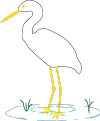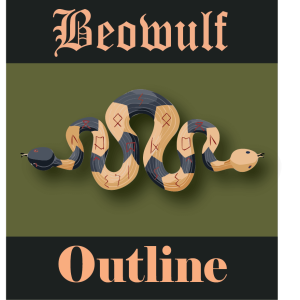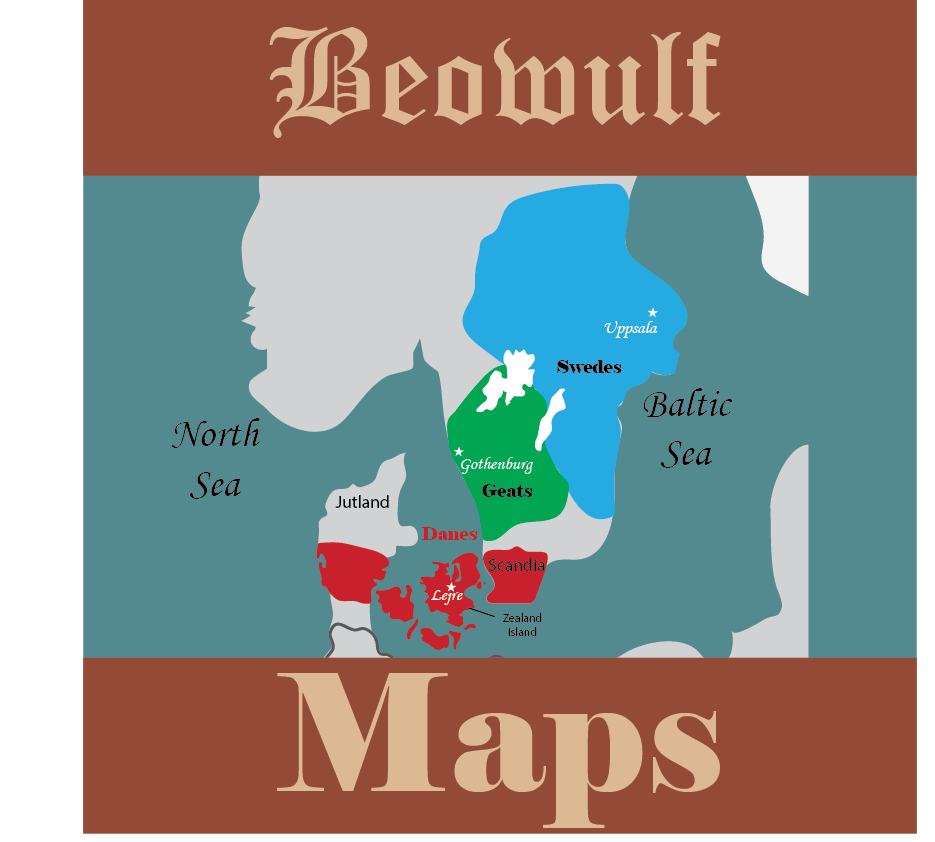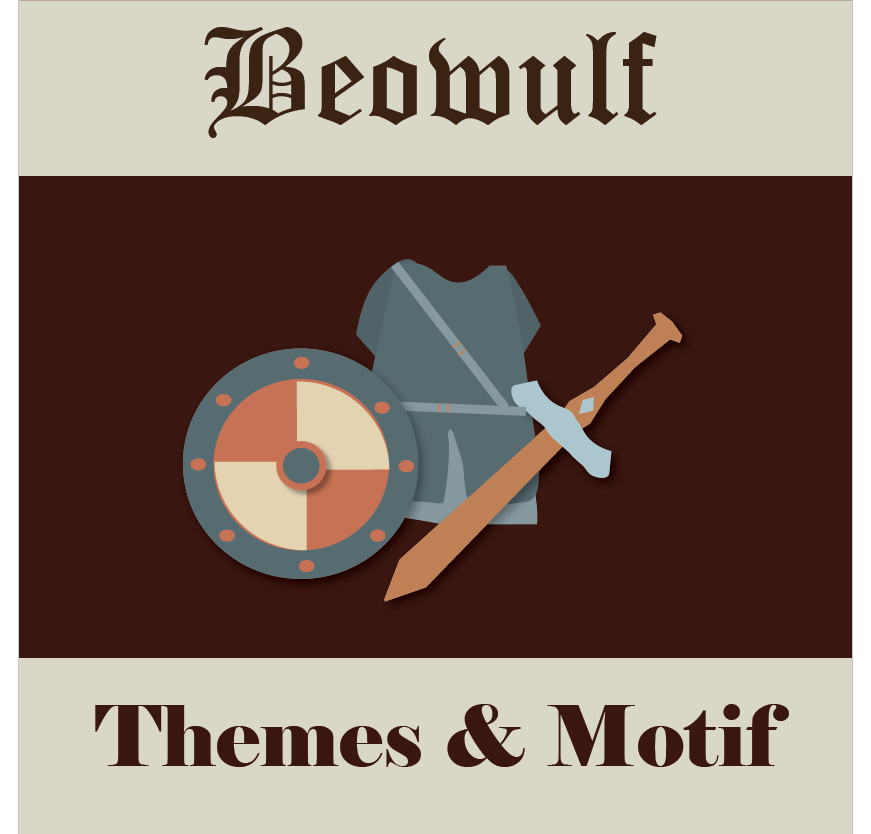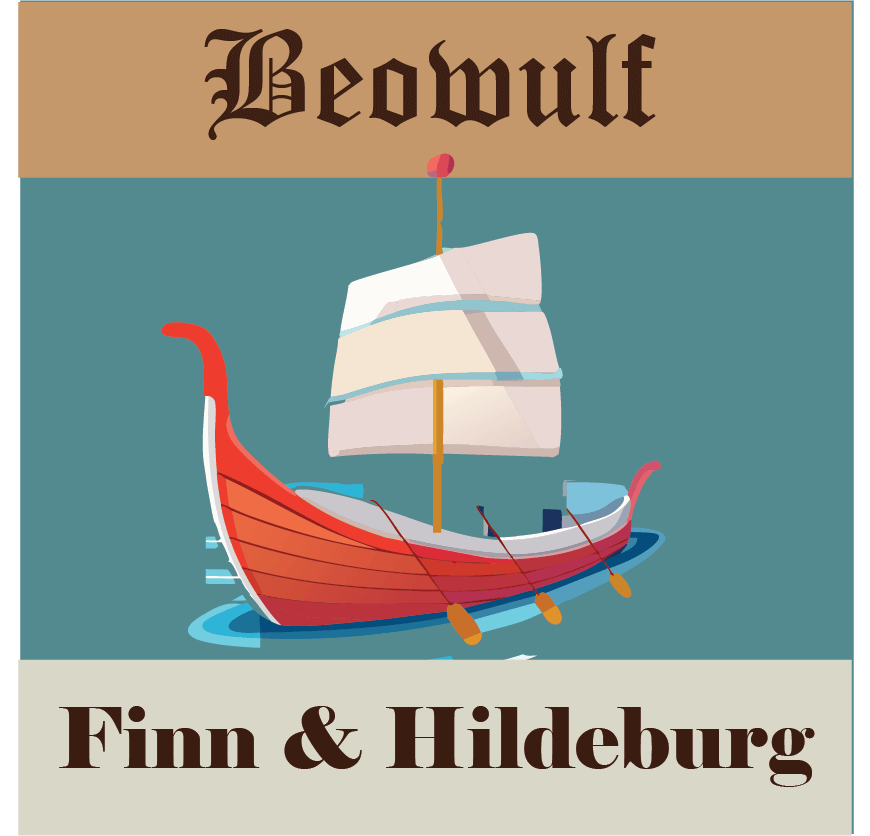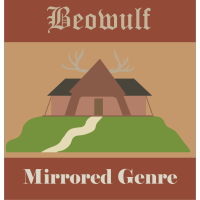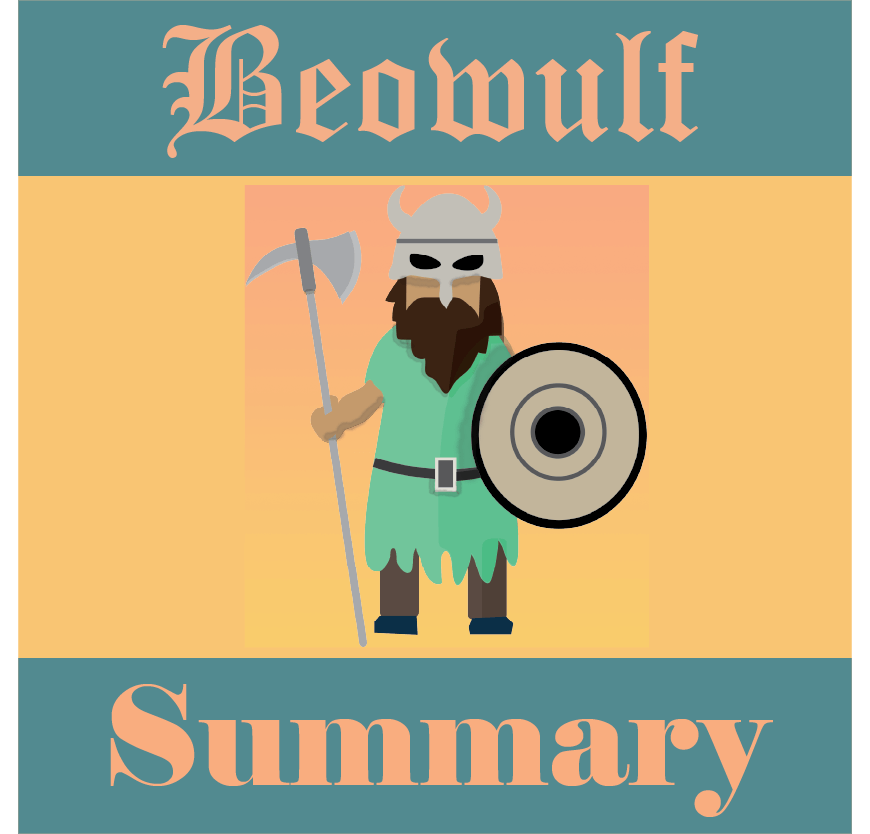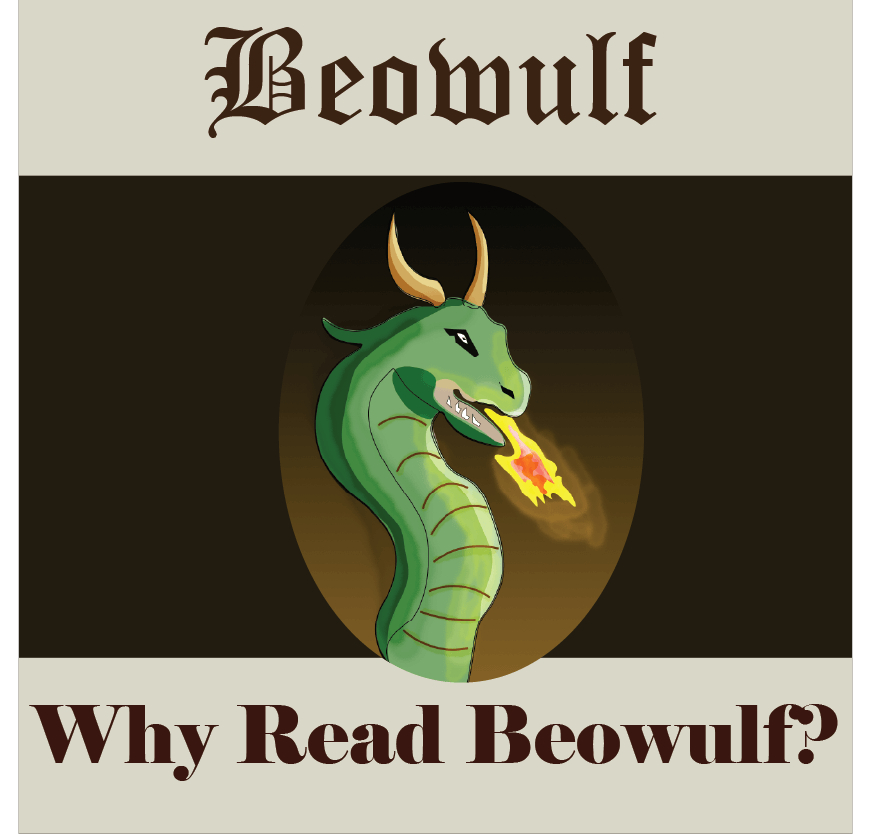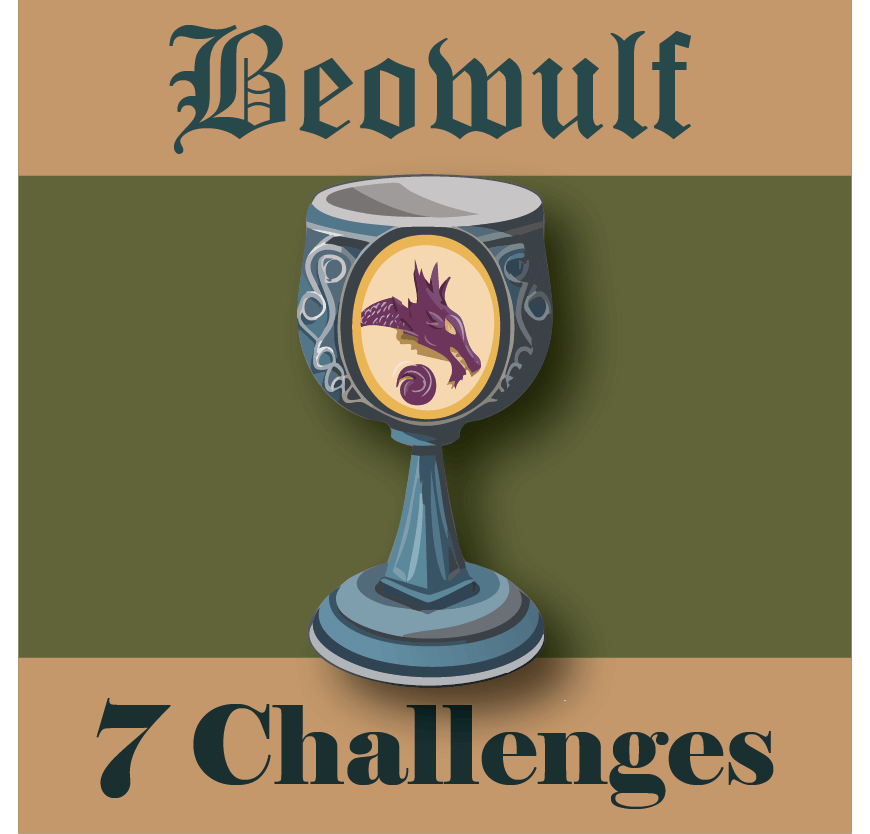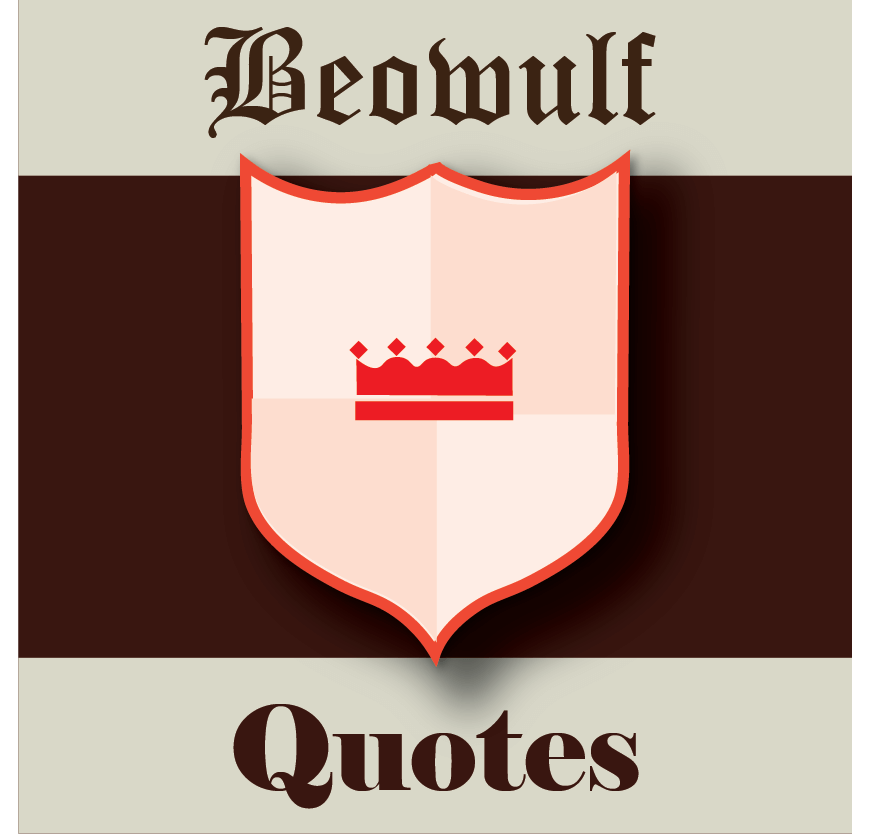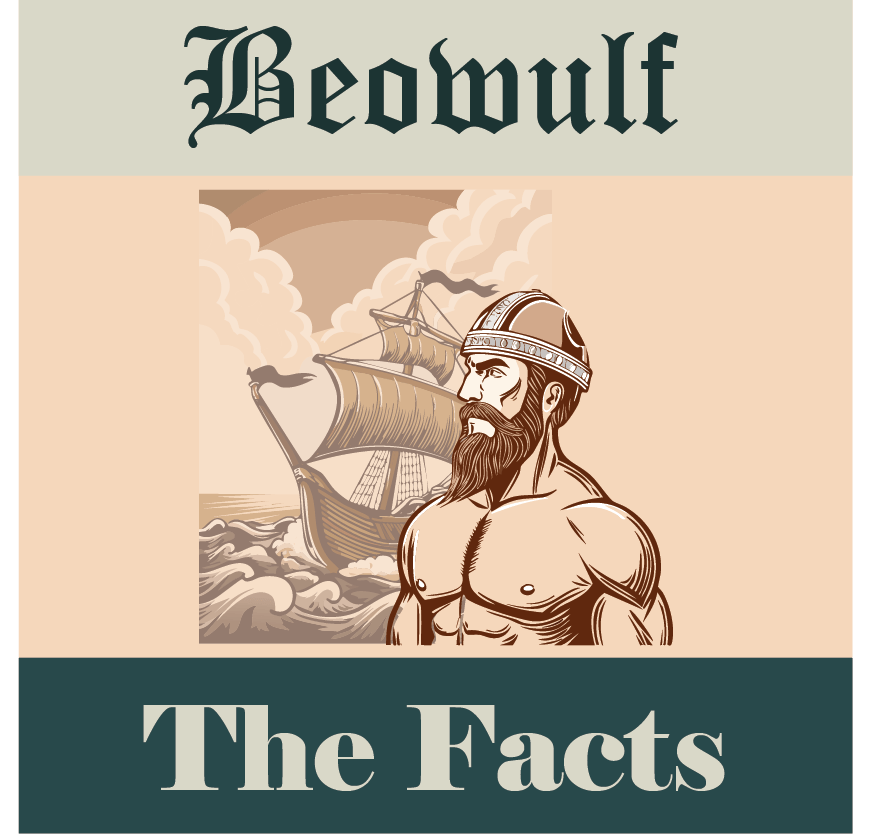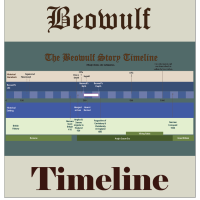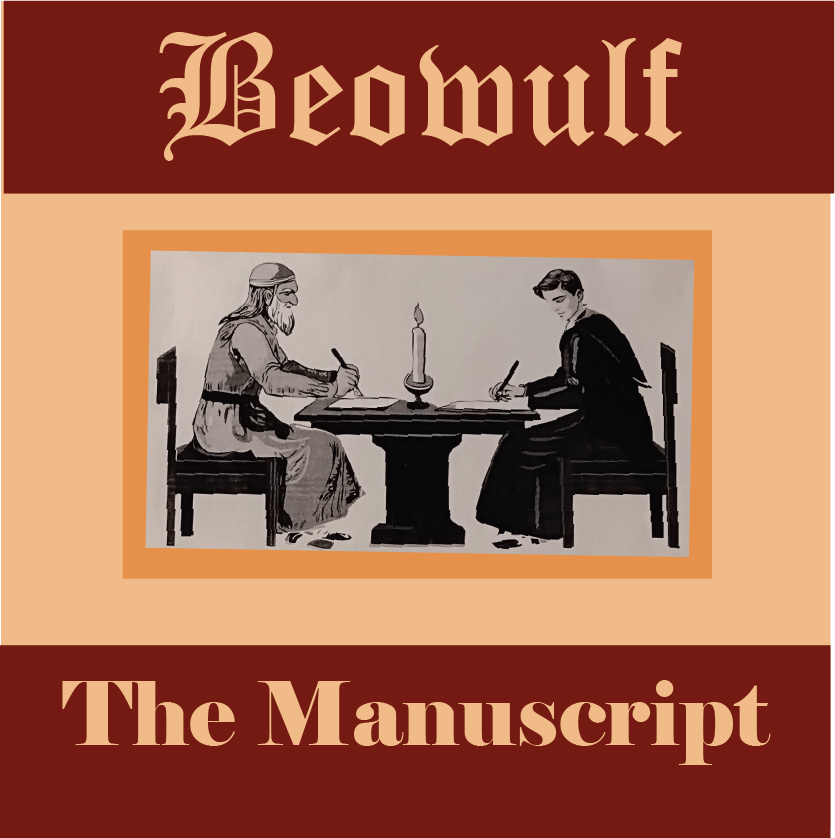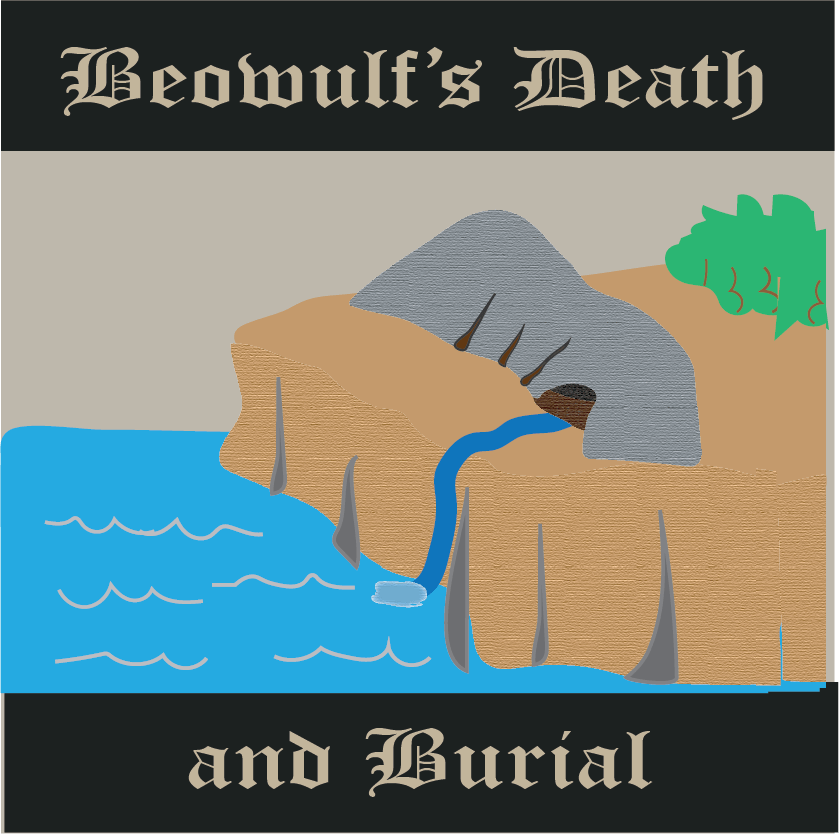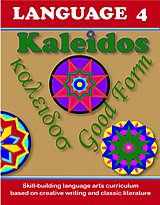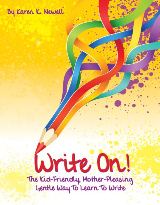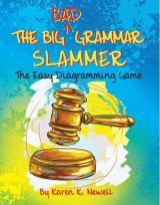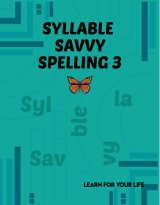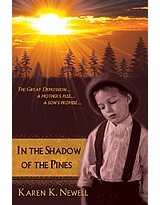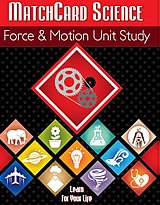
Beowulf Quotes
Best quotes FROM Beowulf and best quotes ABOUT Beowulf.
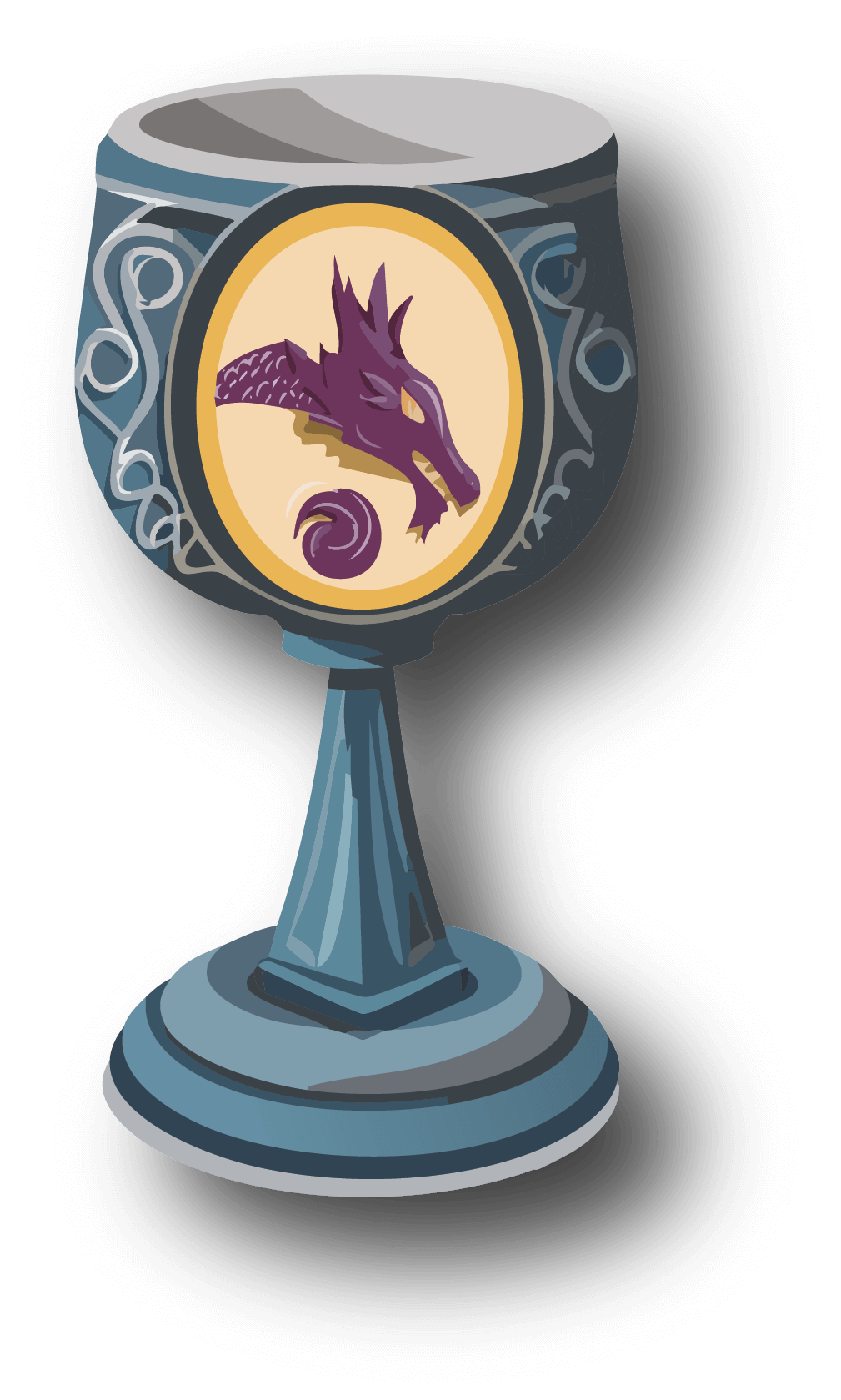
How To Use This Page
While we are in hearty favor of anyone's endeavor to read great quotes from and about Beowulf, this page also serves a more functional purpose.Great scholars, of course, have written volumes about the ancient text. It is, however, a little harder for students who are first time readers, say middle schoolers and high schoolers - to write about the historical or philosophical insights on its pages.
An easy to use writing technique is to take a great quote from a book (or about it) and use it as the basis of a thesis on a work.
(Example: The quote "xyz" sums up one of the main purposes of this poem. We can compare how each of these three kings reflects that statement.)
Of course, it all dependings on WHICH quote one might use. All of the quotes below, could be the basis for exploring major parts of the Beowulf text.
So while we present this collated quotes for the benefit of first-time readers, they are gladly shared also with the casual fan or the graduate student as a handle on an epic work.
Words of Wisdom FROM the Poem
From the watchman at the shore:"The difference surely
’Twixt words and works, the warlike shield-bearer
Who judgeth wisely well shall determine."
Hall, V, Lines 29-31
OR Another translation of the same: "A man of keen wit who takes good heed will discern the truth in both words and deeds."
Tolkien, 2015, Line 232.
OR in Strong's rhyming translation:
Outspake the fearless henchman, the guard on his steed astride:
‘Surely unto a keen-souled fighter it falleth to decide
The difference ‘twixt deeds and sayings, if wisdom take his part,
And I learn that your thanes cometh with kindly and loving heart.
Strong, page 9
Probably Beowulf's most famous words:
Fate ever goes as it must
Gordon, Section VII (All translations carefully render this line which makes a good analysis of the action plot.)
About the Danish Beow or Beowulf - not the poem's main character:
So shall a young man bring good to pass with splendid gifts in his father’s possession, so that when war comes, willing comrades shall stand by him, again in his old age, the people follow him. In every tribe, a man shall prosper by deeds of love.
Gordon, Section I
(Hint: Compare the Beow at the beginning to the ending of the main character Beowulf. NOT that we would EVER suggest a thesis topic. Would we?)
For those who wish to explore some of the humor, let's start with sea-monsters:
With my beloved sword, I ministered to them, as it was meet.
Tolkien, Line 455
Tossed with an understatement about fighting Grendel:
Hence I seek not with sword-edge to soothe him to slumber,
Of life to bereave him, though well I am able.
Hall, XI, Line 18-19.
Theme of fate vs courage:
Fate oft saveth a man not doomed to die, when his valour fails not.
Tolkien, Line 464
OR another:
Fate often succors (helps) the undoomed warrior when his valour is strong.
Gordon, Section X
From Queen Wealhtheow to Beowulf - a plea:
Be thou blessed, O Prince, while thy life endures. A wealth of precious things I wish thee with good heart. Be thou to my sons kindly in deeds, possessing days of mirth.
Tolkien, Line 1013
To Hrothgar on the loss of his treasured councilor:
"Grive not, O wise one! Better it is for every man that he should avenge his friend than he should much lament. To each one of us shall come in time the end of life in the world; let him who may earn glory ere his death.
Tolkien, 2015, 1157-1158
On joy and pain:
The Lord ruled over all mankind as he still does. Wherefore understanding, foresight of soul, is everywhere best. He who sojourns long in the world in these days of sorrow must needs suffer much of weal and woe. Gordon, Section XVII
Hrothgar's warning:
The flower of thy might
lasts now a while: but erelong it shall be
that sickness or sword thy strength shall minish,
or fang of fire, or flooding billow,
or bite of blade, or brandished spear,
or odious age; or the eyes' clear beam
wax dull and darken: Death even thee
in haste shall o'erwhelm, thou hero of war!
Gummere 1762-1769
A lesson to be learned:
Wealth can easily,
Gold on the sea-bottom, turn into vanity
Each one of earthmen, arm him who pleaseth!
Hall, Section 38, Lines 13-15
Gold is the glittering jewel of the first half of the poem, and the cause of all woe in the last half:
Gold in the earth, where ever it lies
useless to men as of yore it was.
Gummere, Line 3167 - 3168
Quotes ABOUT the character of Beowulf
Steadfast, loyal, chivalrous (according to the sentiment of the author's time) but with a smouldering fire. He is on the good side: his enemies are wild beasts, monstrous and evil creatures, or his king's and people's foes. But when roused he is capable of violent and superhuman action.Tolkien, 2015, pg 213
Hrothgar was right:
I say that the Geats
Could do no better, find no man better
Suited to be king, keeper of warriors,
And their treasure, than you - If you take the throne
They will surely offer you.
Raffle 1849 - 1853
Then under the hand of Beowulf passed the spacious kingdom’s hold,
Well he wielded it fifty winters, and was waxen a monarch old.
Strong, page 68
Surprise words about our ugly-ducking-turned-hero:
Long was he spurned,
and worthless by Geatish warriors held;
him at mead the master-of-clans
failed full oft to favor at all.
Slack and shiftless the strong men deemed him,
profitless prince; but payment came,
to the warrior honored, for all his woes.
Gummere 2184-2189
A good man and great king:
So Ecgtheow’s bairn brave did prove him,
War-famous man, by deeds that were valiant,
He lived in honor, belovèd companions
Slew not carousing; his mood was not cruel,
But by hand-strength hugest of heroes then living
The brave one retained the bountiful gift that
The Lord had allowed him.
Hall XXXI, Line 32 - 38
Brave and forever triumphant, Until Fate sent him to the dragon and to death.
Raffel, Line 2400
"I shall with my valour win the gold, or else shall war, cruel and deadly evil, take your prince. Tolkien, 2015, 1128-1129
Abandoing the treasure of mighty men to earth to keep, gold to the ground where yet it dwells as profitless to men as it proved of old. Tolkien, 2015, 2653-2654
A final tribute:
Of men he was mildest and most beloved
to his kin the kindest, keenest for praise.
Gummere, Lines 3178 - 3182
Quotes FROM the poem About the World
Come from afar over the encircling seaTolkien, 2015, Line 251
as soon as the light of evening is hid beneath heaven's pale
Tolkien, 2015, Line 333
The winsome wold that the water encircleth,
Set exultingly the sun’s and the moon’s beams
To lavish their lustre on land-folk and races
Hall, Section II, Lines 39-41
The coldest of storms, glooming night, a wind from the north came with cruel onslaught against us; rough were the waves.
Tolkien, 2015, Line 444
Then the sea, the tide upon the flood, with boiling waters swept me away to the land of the Finns.
Tolkien, 2015, Line 470
Many a man oft declared that South or North the Two Seas between was there no other beneath the encircling sky
Tolkien, 2015, Line 697
Grendel's Destiny:
Forced of fate, he shall find his way
to the refuge ready for race of man,
for soul-possessors, and sons of earth;
and there his body on bed of death
shall rest after revel.
Gummere, 1004-1008
Winter winds and waves:
winter in ice-bonds closed up the currents
Hall XVIII, Line 8
Thence the surge of waves mounts up dark to the clouds when the wind stirs up hostile storms til the air darkens, the skies weep.
Gordon, XXI
His speach about Thryth gave a hint to their view of their place in the world:
She kept a noble love towards the prince of heroes,
the best as I have heard, of all mankind, of the races between the seas.
When heaven’s bright jewel o’er earthfields had glided
Hall, XXX, 39-40
Quotes About the Purpose of the Poem
Tolkien
Monsters are not an inexpicable blunder of taste: they are essential, fundamentally allied to the underlying ideas of the poem...The key to the fusion point of imagination that produced this poem lies, therefore, in those very references to Cain which have often been used as a stick to beat an ass - taken as an evident sign (were any needed) of the muddled heads of early Anglo-Saxons. They could not, it was said, keep Scandinavian bogies and the Scriptures separate in their puzzled brains. The New Testament was beyond their comprehension...
...One does not have to wait until all the native traditions of the older world have been replaced or forgotten; for the minds which still retain them are changed, and the memories viewed in a different perspective: at once they become more ancient and remote, and in a sense darker...Its display has grievously perturbed the critics, for the author draws upon tradition at will for his own purposes...
...He cast his time into the long-ago, because already the long-ago had a special poetical attraction...
The monsters remained the enemies of mankind, the infantry of the old war, and became inevitably the enemies of the one God....The tragedy of the great temporal defeat remains for a while poignant, but ceases to be finally important.
Tolkien, 1983, Monsters. pg 19-22
It was a good tale, much of it already known and popular with the kind of men that he addressed. But as is clear enough he retold it with a purpose. This 'purpose'... might in brief be represented thus:
"There is One God, supreme ruler of the world... By Him all events (wyrd) are governed. From Him proceed all good things and gifts. This has always been so. It was in the days of your fathers' fathers... Good and wise men of those days feared God and thanked Him.
Here is the great warrior Beowulf. You admire him. He was worthy of it. God gave him an astonishing gift of more than human strength - he recognized it as a gift...You will observe that though he is eager for glory, self-aggrandisement is not his main motive. His first great deed is the overcoming of a monster...His other deeds are done as a service to his king and his people; he dies in their defense. Beowulf does not come first with Beowulf. He is loyal, even to his own disadvantage.
This, then is the story of a great warrior of old, who used the gifts of God to him, of courage, strength and lineage rightly and nobly. He may have been fierce in battle but in dealing with men he was not unjust...In his time and country no news had come of Christ. God seemed far off and the Devil was near; men had no hope. He died in sorrow fearing God's anger. But God is merciful. And to you, now young and eager, death will also come one day, but you have hope of Heaven. If you use your gifts as God wills. Bruic ealls wel!" (Use all gifts with honor.)
Tolkien, 2015, pg 273-275
He was composing for men of his own day, and he doubtless had good reason for his choice of theme...His main story would be as real to his audience as would have been an account of the strife for the Danish throne among the members of the Scylding dynasty; and in the course of it, the poet had placed the race of monsters in relationship to a Christian universe, and has shown that they can be overcome by human beings of courage and fortitude who fight them with faith in God.He has shown that humanity is not left helpless in the hands of evil powers. That was no trivial theme to the men of that day.
Whitelock, 1951. pg 95.
Quotes About the Value and Inspiration of the Poem
His poem is like a play in a room through the windows of which a distant view can be seen over a large part of the English traditions about the world of their original home.Tolkien, 2015, pg 254
Now, whatever we may think of Beowulf as poetry, it is remarkable for its conscious and deliberate art, and for the tone of civilization which pervades it.
R.W. Chambers, 1921, Appendix D, pg 272
Something more significant than a standard hero, a man faced with a foe more evil than any human enemy of the house or realm, is before us, and yet incarnate in time, walking in heroic history, and treading the named lands of the North.
Tolkien, 1983. Monsters. 1983, pg 17.
Let us by all means esteem the old heroes: men caught in the chains of circumstance or their own character, torn between duties equally sacred, dying with their backs to the wall. But Beowulf, I fancy, plays a larger part than is recognized in helping us to esteem them. Heroic lays may have dealt in their own way...with the actions of heroes caught in circumstances that conformed more or less to the varied but fundamentally simple recipe for an heroic situation...It is in Beowulf that a poet has devoted a whole poem to the theme, and has drawn a struggle in different proportions, so that we may see man at war with the hostile world, and his inevitable overthrow in Time.
Tolkien, 1983, Monsters, pg 17-18.
The tales he recalls are well known to his audience, but perhaps he is putting an unusual type of emphasis on them, stressing the suffering caused to innocent persons rather than the triuph of successful warfare and vengenace. Maybe he is asking: 'What would Hildeburh have said of the way in which the retainers of Hnaef "repaid the shining mead"?' Their loyalty cost her a son, a husband, and a home. And did not Hygelac bring disaster on his people when he made his celebrated Rhineland raid, attacking 'out of pride' a people with whom he was not at war?
When we have read his poem as a poem, rather than as a collection of episodes, we perceive that...he and his hearers were thinking of "the great earth, ringed with the shoreless sea, beneath the sky's inaccessible roof": whereon as in a little circle of light about their halls, men with courage as their stay went forward to that battle with the hostile world and the offspring of the dark which ends for all, even the kings and champions, in defeat. That even this 'geography' once held as a material fact, could now be classed as a mere folk-tale affects its value very little. It transcends astronomy. Not that astronomy has done anything to make the island seem more secure or the outer seas less formidable.
Tolkien, 1983, Monsters, pg 18.
We are left marveling that while fate may have been invincible in Beowulf's world, yet a man could achieve greatness in defiance of that fate.
Mitchell & Robinson. 1998, pg 30.
On the theme of Fate vs God vs Courage/Honor:
The fundamental tenet of One God, creator and ruler of all, inscrutable maybe in His decisions in this or that case, but still 'benevolent' to Men, and each man, and of a life hereafter, had not dethroned fate, inexorable, unconcerned with good or ill in deeds, and the opposition to it of unbending pride, self-will, with the reward of glory, the praise of men (not of the Judge), now or hereafter. Fate and glory never have, or course, been completely dethroned, but it is a matter of degree.
Tolkien, 2015, pg 272-273
Germanic Culture:
The Beowulfian society is noble, aristocratic, and considering the age it represents, pre-eminently remarkable for its refinement and courtly demeanor. The old Germanic military ideals are still clearly recognizable, notwithstanding the Christian retouching of the story -- the prime requirement of valor, the striving for fame and the upholding of one's honor, a stern sense of duty, the obligation of blood revenge, and above all the cardinal virtue of loyalty which ennobles the comitatus relation and manifests itself in unflinching devotion and self-sacrifice on the part of the retainer and in kindness, generosity and protection on the part of the king. To have preserved for us a faithful picture of many phases of the ancient Germanic life in its material as well as its moral aspect is indeed one of the chief glories of Beowulf.
Klaeber, 1922. lxii
Christian gentleness, working upon the passions of the Heroic Age, produces at once a type which is the rough outline of what later becomes the medieval ideal of the knight, or the modern ideal of the gentlemen... In the Heroic Age, elementary passions are still very near the surface...In the epoch of Beowulf, a Heroic Age more wild and primitive than that of Greece is brought into touch with Christendom, with the Sermon on the Mount with Catholic theology and ideas of Heaven and Hell.
Chambers, 1925, xxvii.
The poet is not satisfied with reciting facts, heroic and stirring though they be. Nor does he trouble to describe in a clear, concrete manner the outward appearance of the persons, even of the principal hero, though he sets forth with eloquence, the striking impression he makes on others. But he takes the keenest interest in the inner significance of the happenings, the underlying motives, the manifestations of character...
Klaeber, 1922. pg lviii
With special fondness does the author dwell on the feelings of grief and sadness...It almost seems as if the victories of the hero and the revelries in the hall produce only a temporary state of happines since 'ever the latter end of joy is woe.'
Klaeber, 1922. pg lviii
Quotes About Analysis of the Poem
The reader will please keep well in mind that there is no Beowulf-theory against which really formidable arguments cannot be marshalled, and that all I wish to say for the following is that it is the one which seems to me the least improbable.JRC Hall, 1901. xxiv The above is a great quote for contrasting two competing theories about the text.
To try to penetrate the darkness of the five centuries which lie behind the extant manuscript by fitting together such fragments of illustrative information as can be obtained and by using the imagination to bridge the gaps, has been the business of three generations (Editor's note: now six generations) of scholars distributed among the ten nations of Germanic speech. A whole library has been written around our poetry and the result is that this book cannot be as simple as either writer or reader might have wished.
R.W. Chambers, 1921, An Intro, pg 5
I cannot avoid a suspicion that the fifty years' reign of Beowulf over the Geatas may quite conceivably be a poetic fiction; that the downfall of the Geatic kingdom and its absorption in Sweden were very possibly brought about by the destruction of Hygelac and all his warriors at the mouth of the Rhine.
R.W. Chambers, 1921, Chapter One, Section II, page 15
The poem may indeed reflect the realities of comitatus equipment more accurately than had been imagined. (Editor's note: In this chapter Webster highlights the similarity between archaeological finds and the poem in regards to the following: twisted wire in the helmets, boar figures on the helmet, mail coat consisting of rows of rings, broad rimmed shield with central boss, runic descriptions and snake-like formations on sword hilts, gilded bridles for horses and jeweled saddles, and iron fittings and door hinges on the mead hall.)
Webster, L. 1998. pg 188.
On archaeological support for the poem's accuracy:
The great irony is not that our oft-maligned poet has written the world’s best read fairy-tale about trolls, sea-monsters and a dragon which is a required course of study at prestigious universities; or even that their historians, archaeologists, philologists, and paleographers scrutinize and debate not just every word and word ending, but every stroke, minim, and dot on the prized manuscript. No, the real irony is that the historians and archaeologists keep confirming the accuracy of his fairy-tale. At this point, maybe we ought to send a team out to look for the dragon’s carcass at the bottom of a cliff.
Newell, K. 2024, pg 181.
On Interpolations:
The Christian elements are almost without exception so deeply ingrained in the very fabric of the poem that they cannot be explained away as the work of a reviser or later interpolator...It is true that the action itself is not modified or visibly influenced by Christianization. But the quality of the plot is changed. The author has fairly exalted the fights with fabled monsters into a conflict between the powers of good and of evil.
Klaeber, 1922. pg 50
Why the author only quotes the Old Testament:
The theme which the poet has chosen, the ravages of monsters among mankind, leads him naturally to think of the giants of Genesis, and, indeed, forces him to find a place for his monsters in the scheme of Creation, as set out in Genesis. It is his theme, not his inclination, still less any doubt of his audience's knowledge of Christianity, that limits his allusions to Old Testament history.
Whitelock, 1951. pg 7.
It is certain that the story of the monster invading a dwelling of men and rendering it uninhabitable, till the adventurous deliverer arrives, did not originate with Hrothgar and Heorot. It is an ancient and widespread type of story, of which one version is localized at the Danish court. When therefore we find it existing, independently of its Danish setting, the presumption is in favour of this being a survival of the old independent story. Of course it is conceivable that the Hrothgar-Heorot setting might have been first added, and subsequently stripped off again so clean that no trace of it remains. But it seems going out of our way to assume this, unless we are forced to do so.
R.W. Chambers, 1921, Chapter 2, Section 2, page 47
The men who wrote short lays wrote them for their own pleasure: they were not thinking of providing material convenient for the purpose of some epic poet who was to come after them. Therefore it should not be assumed, without evidence, that these lost lays of heathen times were of such a character than an epic could easily be made by fitting them together. Half a dozen motor-bikes canot be combined to make a Rolls-Royce car.
Chambers, 1925, xxv.
Now Beowulf, son of Scyld, clearly corresponds to a Beow or Beaw in the West Saxon genealogy...Hence arose further speculation of many scholars that the hero who slays the monsters was originally called, not Beowulf, but Beow, and that he was identified with the hero in the West Saxon pedigree; in other words that the original story was of a hero Beow (son of Scyld) who slew and a monster and a dragon and that this adventure was only subsequently transferred to Beowulf, prince of the Getas... This is a theory based upon a theory, and some confirmation may reasonably be asked, before it is entertained.
R.W. Chambers, 1921, Chapter 2, Section 1, pg 40
The large part which the sea played in the life of the Beowulfian peoples, finds expression in an astoning wealth of terms applied to it and in numerous allusions to its dominating geographical importance.
Klaeber. 1922. pg lx
Previous editors have tried to distinguish between the historical and the fabulous...The distinction is a valid one for modern scholars, though the lines are often hard to draw, but it is by no means certain that Beowulf, Grendel and his kin, and the dragon, were any less real to the poet and his audience than was the historical Hygelac.
Bruce & Mitchell. 1998. pg33
As in any period of English history, their society was one in which attitudes to Christianity varied from the fervent to the lukewarm to the hostile. To this uncertainty must be added others. We do not know who made it or by whom, when, or where, it was first heard. We cannot be certain what the author took for granted in his audience.
Bruce & Mitchell. 1998. pg 35
The Anglo-Saxons regarded themselves as Germans and continued to repeat the songs and legends which they had brought over with them - including verified catalogues of the kings and tribes of Germany and the North.
Whitelock. 1952. pg 18
The sixth and seventh centuries have long attracted the attention of English and Swedish scholars in connection with Beowulf, and it is not hard to see why. The princely burials of that date contain all the ingredients found in Beowulf: elaborate funeral rituals involving ships, cremation, burnt and unburnt treasure, great memorial mounds, and the objects themselves, elaborately decorated weapons, gold and silver vessels, horse trappings, drinking horns, harps, and chain mail. Investigation of all these, their ornament and symbolism, seems to lead directly to Beowulf...The complexity of ritual and ornament provide a visual version of the poetic imagery.
Hills. 1997, pg 308, 309
After discussing examples of wergild and revenge in Anglo-Saxon documents:
Any man of the [original] audience might find himself suddenly forced to become an avenger by necesity, perhaps in circumstances that involved his acting counter to his inclination and affections. The dilemma of an Ingeld or a Hengest might one day be his own. The poet's allusion to characters such as these give his poem more than an 'historical' background; they hint at a problem that was real to the poet's contemporaries.
Whitelock, 1951. pg 17
The poem moves forward, sideways, and backward, in time, but also in a circle, for it begins with a leaderless people who have found a leader and ends with a people who, having lost a leader, face a perilous future.
Mitchell. 1998. pg 36.
It is remarkable that in the account of the three great fights of the hero, care has been taken to state the outcome of the struggle in advance. Evidently disregard of the element of suspense was not considered a defect in story telling... Sometimes the result of a certain action is mentioned first, and the action itself mentioned afterward (or completely passed over.)
Klaeber. 1922. pg lvii
And you just have to love this one:
Beowulf is the most enigmatic work in English literature...there has never been any shortage of people who are quite sure they understand the poem perfectly. Only they never agree with each other.
Shippey. 2022. pg 1-2.
References Cited Above
Beowulf Translations Quoted Above
Hall, Lesslie PhD. Beowulf: An Anglo-Saxon Epic Poem. D.C. Heath & Co Publishers, 1892.Gordon, R.K. 1926. Beowulf. Reprint in Dover Publications 1992.
Gummere, Francis. 1909. Beowulf: A Translation.
Raffle, Burton. 1963. Beowulf. Signet Classics.
Strong, Archibald. 1925. Beowulf: Translated into Modern English Rhyming Verse with Introduction and Notes. Constable and Company, LTD, London.
Tolkien, JRR. 2015. Beowulf: A Translation and Commentary. Houghton, Mifflin, Harcourt
Commentary About the Beowulf poem
Chambers, R.W. 1921. An Introduction to the Study of the Poem with a Discussion of the Stories of Offa and Finn. (Quotes above by the Alpha Edition of 2021)Hills, Catherine. 1997. “Beowulf and Archaeology,” Chapter 15 in A Beowulf Handbook, Bjork & Niles, editors. University of Nebraska Press.
Klaeber,Fr. 1922. Beowulf and the Fight at Finnsburg. D.C. Heath and Company.
Mitchell, Bruce. and Robinson, Fred. 1998. Beowulf, An Edition with Relevant Shorter Texts. Blackwell Publishing. pp 183-194
Newell, Karen. 2025. Facing the Dragon: A Beowulf Unit Study. Learn For Your Life Publishing.
Shippey, Tom. 2022. Beowulf the the North Before the Vikings. Arc Humanities Press.
Tolkien, JRR. 2015. Beowulf: A Translation and Commentary. Houghton, Mifflin, Harcourt.
Tolkien, JRR. 1983. Monsters and the Critics. Harper Collins.
Webster, Leslie. 1998. “Beowulf and Archaeology.” Chapter in Mitchell, B. and Robinson F. Beowulf, An Edition with Relevant Shorter Texts. Blackwell Publishing. pp 183-194
Whitelock, Dorothy. 1951. The Audience of Beowulf. Oxford Clarendon Press. (reprint)
Whitelock, Dorothy. 1952. The Beginnings of English Society. Penguin Books.
Get the Beowulf Unit Study
Unlock the action plot, history, and debates of the ancient tale.
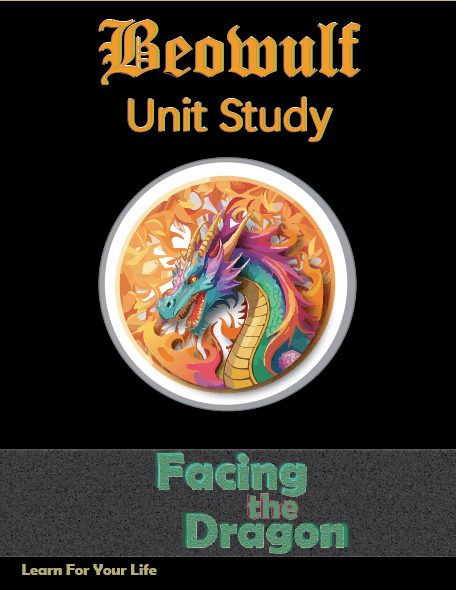
Available in Paperback OR Printable Download
253 pages
(Includes Student Pages, Teacher Key, References, Maps, Charts and More!)
Print It Now

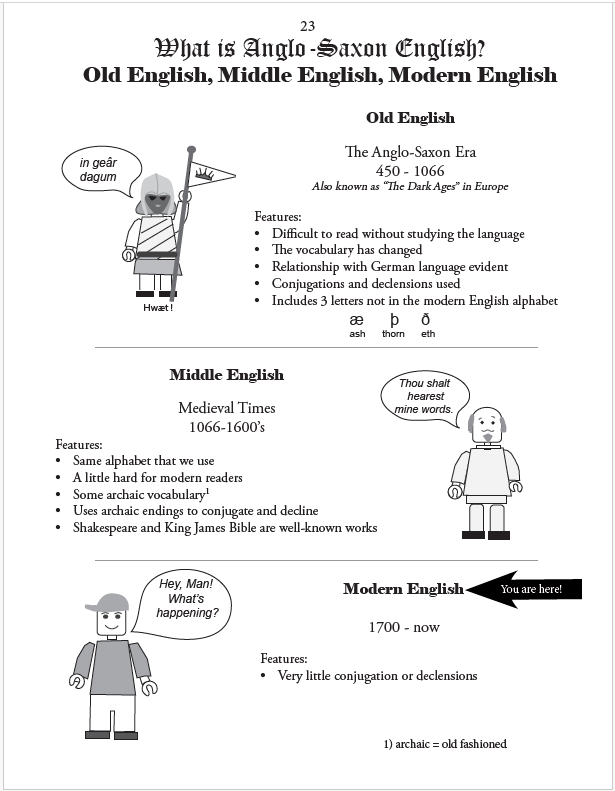
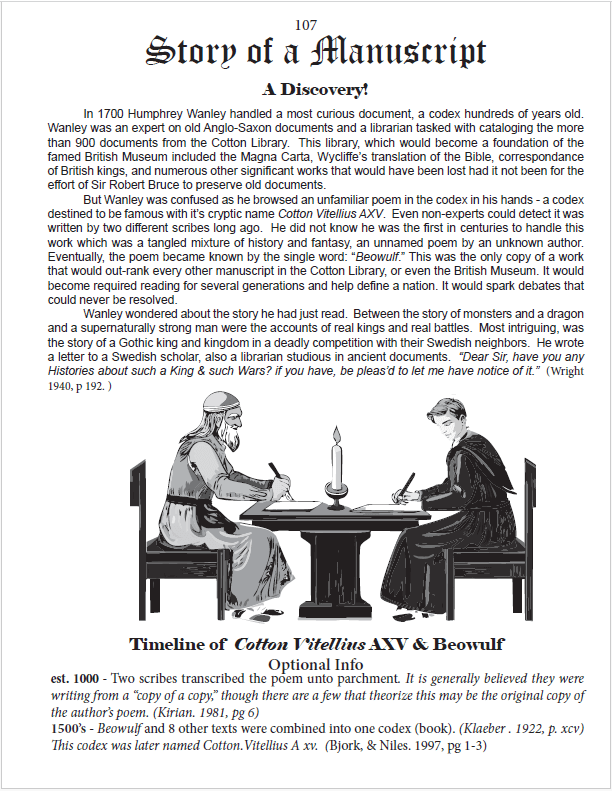
![]()
$5.99 Your link to print will last for five days.
Ready-in-a-minute lesson plans can be used with any translation.
Easy-to-read summary for each section.
Softcover Edition - Mailed to You
The same pages are in the softcover book and the printable file. Keep your papers bound together and use this book for years to come. It will be your go-to-guide for all things Beowulf!
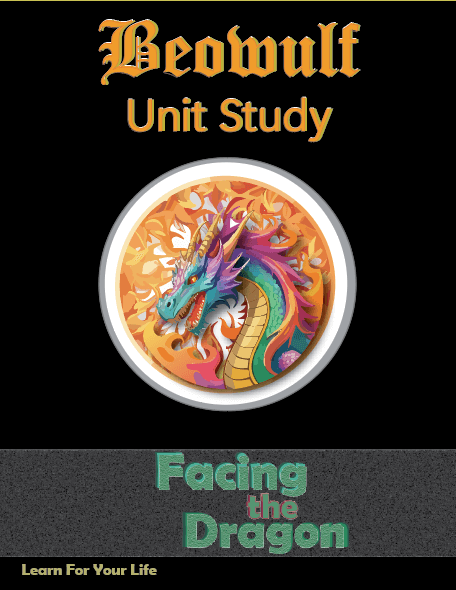
![]()
17.95 Soft Cover Manual
Mailed to You
Beowulf Pages
Check here for all things Beowulf.
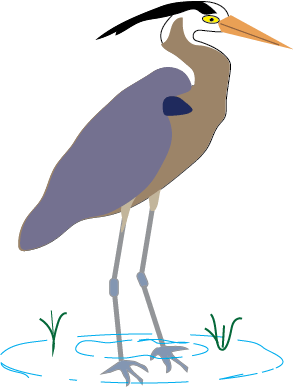
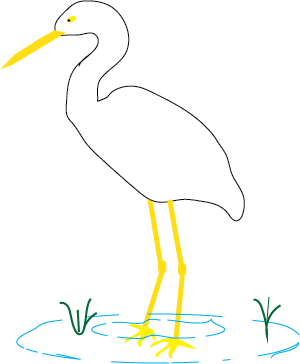
About Our Site
Hands-On Learning

